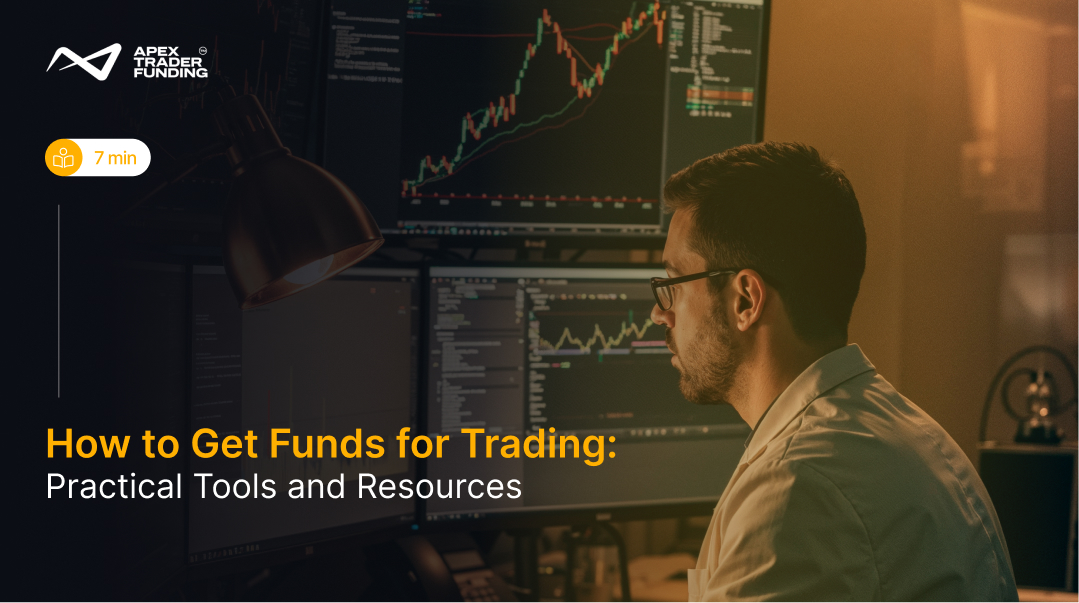
trading-education | 25-08-25
Starting a trading journey often requires more than knowledge—it requires capital. Yet many aspiring traders face the same challenge: how to secure the funds needed to put their strategies into practice. The good news is that modern finance offers multiple paths, each with different levels of accessibility, risk, and control. By understanding these funding options and the tools available, traders can make informed decisions about how to fuel their market participation.
Personal Savings and Budget Allocation
A simple starting point for many traders is relying on their own savings to fund initial trades. By setting aside a portion of monthly income, traders can build a dedicated trading fund without outside obligations.
However, this approach requires discipline. The key is to treat trading capital like a separate budget, similar to an emergency or retirement fund. Traders who adopt this method often use expense-tracking tools or budgeting apps to monitor progress and avoid dipping into funds meant for other financial goals.
Discipline in budgeting isn’t just about cutting costs—it’s about building the first layer of trading capital without external pressure.
Peer and Community-Based Funding
For some, connecting with trading communities or peer groups opens opportunities for small-scale funding support. This can take the form of informal capital pooling or structured partnerships where traders share both risk and reward.
Community-based funding introduces accountability, as multiple participants expect transparency. It also highlights the importance of clear agreements—outlining profit-sharing ratios, withdrawal rules, and exit strategies—to avoid disputes later.
Leveraging Brokerage Tools
Modern brokerages often provide resources that indirectly help raise funds for trading. For example, certain platforms offer:
- Margin accounts that allow traders to amplify available capital (though with higher risk).
- Some brokers reward a smooth shift from demo trading to live accounts by offering bonus credits or deposit perks when consistent results are demonstrated in practice.
- Referral programs, letting traders earn credits by introducing new clients to the platform.
Each of these comes with its own conditions, and understanding the fine print ensures traders use these tools responsibly.
⚠️ Financial Risk Warning: Sourcing capital through margin or personal loans carries high risk. Never trade with money you cannot afford to lose.
Crowdfunding and Online Platforms
Digital finance has expanded possibilities through crowdfunding. Traders can present their strategies, track records, or educational value to attract contributors willing to provide capital in exchange for profit-sharing or insights.
Specialized online platforms exist where traders showcase their performance statistics. Success here requires credibility, transparent reporting, and often a strong social media presence to build trust with potential backers.
Expert Insight: If you pursue the crowdfunding route via platforms like FundRequest, your "Information Gain" is your track record. To gain serious investor trust, you must provide a verified MyFxBook or Rithmic report showing a Profit Factor of at least 1.5 over a minimum of 60 trading days. This independent data proves your strategy is repeatable and can withstand different market cycles.
Proprietary Trading Platforms as a Funding Tool
Another effective way to secure trading capital is through proprietary trading platforms. These firms provide structured evaluations where traders can showcase their strategy and discipline. Once the evaluation is passed, the trader gains access to a funded account—capital supplied by the firm—without having to risk their personal savings.
Another effective way to secure trading capital is through proprietary trading platforms. These firms provide structured evaluations where traders can showcase their strategy and discipline. Once the evaluation is passed, the trader gains access to a funded account—capital supplied by the firm—without having to risk their personal savings.
Expert Insight: Prop firms like Apex allow traders to scale without the "Liability Gap" of personal loans. Unlike traditional margin—which can result in a negative balance—a funded account’s risk is capped at the evaluation fee. For example, a 25K Tradovate account provides $25,000 in buying power but limits your total risk to the $1,500 trailing threshold, effectively giving you 16:1 "Risk-to-Capital" leverage without the threat of personal debt.
The advantage here is twofold: first, the barrier to entry is significantly lower compared to attracting private investors or raising large amounts through savings. Second, many prop trading firms offer built-in support systems such as performance dashboards, analytics, and educational materials. This makes them not only a funding source but also a developmental tool for building long-term consistency.
For traders who want to focus on their craft without the stress of raising large sums, proprietary trading platforms act as a bridge between personal preparation and professional opportunity. They’ve become an essential resource in today’s trading ecosystem, fitting naturally alongside other modern funding methods like crowdfunding or brokerage incentives.
Partnerships and Private Investors
Some traders secure funds by partnering with private investors. In this arrangement, investors provide capital while the trader brings market expertise. Returns are usually shared based on arrangements decided beforehand, and succeeding in this setup takes more than trading ability—it calls for reliability and a professional approach.
Investors want reassurance through clear documentation, risk management plans, and regular reporting. A trader’s ability to present themselves like a business often makes the difference in winning trust.
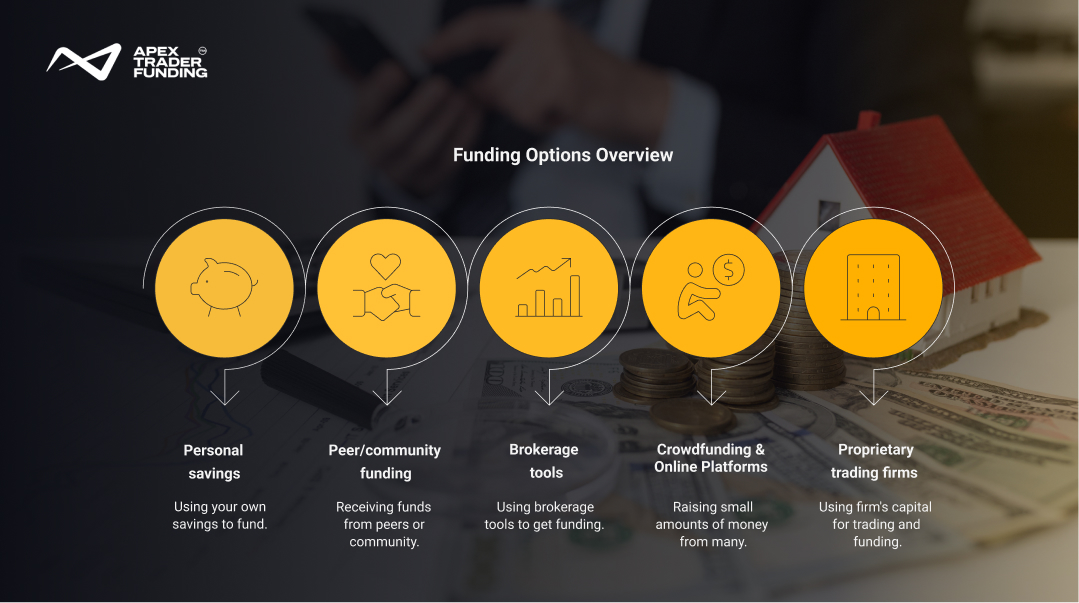
Securing investor backing requires more than strategy—it demands communication, consistency, and trustworthiness.
Building a Funding Roadmap
Rather than relying on a single approach, successful traders often combine methods. A roadmap might look like this:
- Step 1: 3 Months of Demo (Consistency Check) Before risking any capital, dedicate a full quarter to demo trading. The goal here is not just profit, but consistency—proving to yourself that your strategy works across different market conditions without the pressure of real money.
- Step 2: $500 Savings Buffer While trading on demo, set aside a modest, dedicated financial buffer (e.g., $500). This fund serves a specific purpose: it is "risk capital" meant solely for evaluation fees or initial micro-account deposits, ensuring that your household budget remains untouched.
- Step 3: Evaluation Entry Once consistency is proven and your buffer is ready, use that capital to enter a structured evaluation with a prop firm. This allows you to leverage your small $500 buffer into a much larger funded account (e.g., $25k or $50k) upon passing, maximizing your capital efficiency.
This layered approach ensures that by the time you are trading significant capital, you have already established the necessary discipline and financial safety net.
The Role of Tools in Securing Funds
Access to funding is not only about capital sources but also about tools that strengthen credibility. These include:
- Trade journaling software to document consistency.
- Performance analytics dashboards to present results professionally.
- Risk calculators to show structured planning when approaching investors.
By using these resources, traders demonstrate seriousness and improve their chances of attracting financial support.
Final Thoughts
Obtaining capital for trading is rarely a standardized path, as every trader’s journey requires different approaches. From personal savings to investor partnerships, crowdfunding platforms, and competitions, each option carries its own advantages and challenges. The real challenge lies in matching your funding approach to your trading method, risk appetite, and overall objectives.
For those looking to move from practice into consistent execution, structured funding programs provide a way to balance discipline, transparency, and steady growth. By combining clear rules with practical tools, traders can build a framework that supports both short-term learning and long-term development.
Funding gives you access, but it’s discipline that turns access into achievement.
FAQs
You can secure money for trading in several ways, depending on your resources and goals. Many traders start with personal savings or a portion of their budget set aside specifically for trading. Others explore community funding or partnerships, where profits are shared with backers. Crowdfunding and online platforms can also help if you have a credible strategy to showcase. A growing option is joining a proprietary trading firm, which provides access to funded accounts once you pass their evaluation process—allowing you to trade without risking your own capital. The right funding choice comes down to your comfort with risk and the options you have access to.
It is possible to earn a living through day trading, but doing so relies heavily on consistent habits, strong discipline, and careful risk control. Most traders who succeed treat trading like a business—developing strategies, tracking performance, and controlling emotions. It’s important to note that many new traders struggle and only a smaller percentage achieve steady profitability. Using tools such as trading journals, analytics, and funding opportunities through proprietary firms can improve your chances, but income is never guaranteed. Success depends on skill, patience, and the ability to adapt to changing market conditions.
The $25,000 rule, also known as the Pattern Day Trader (PDT) rule, applies to U.S. traders who make frequent day trades. If more than three day trades are placed within five consecutive business days, the trader must keep a minimum account balance of $25,000 to continue trading without restrictions. If the account falls below this threshold, day trading activity becomes restricted until the balance is restored. The rule is meant to protect smaller accounts from excessive risk, but many traders look for alternatives—such as cash accounts, futures markets, or proprietary trading firms—to bypass this limitation while still staying active in the markets.
Related Blogs
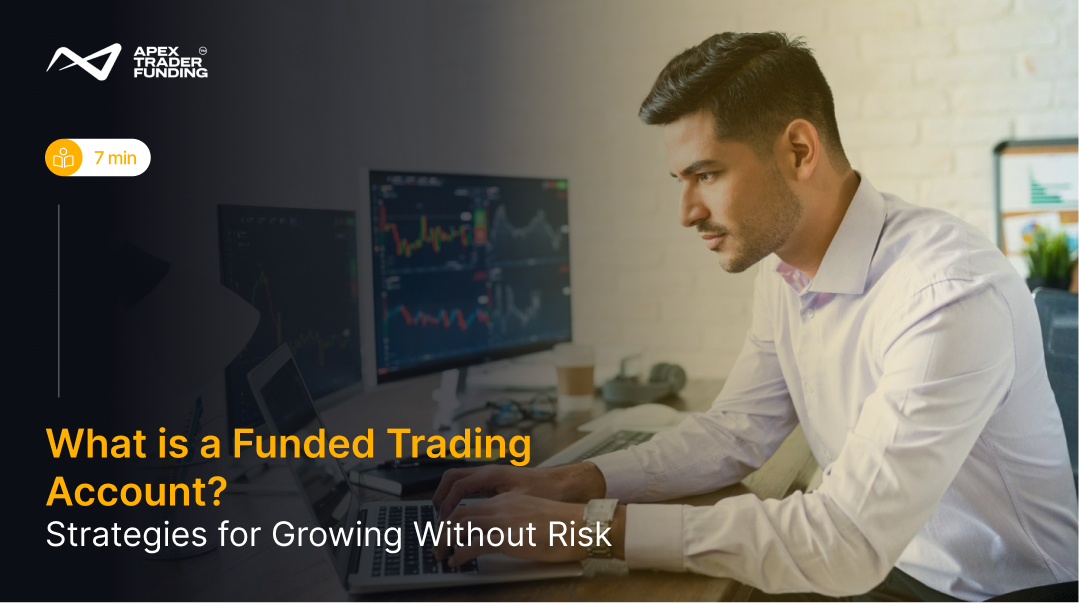
trading-education | 22-08-25
What is a Funded Trading Account? - Detailed Guide
A funded trading account is a financial arrangement where a proprietary trading firm (like Apex) provides you with virtual or...
Read more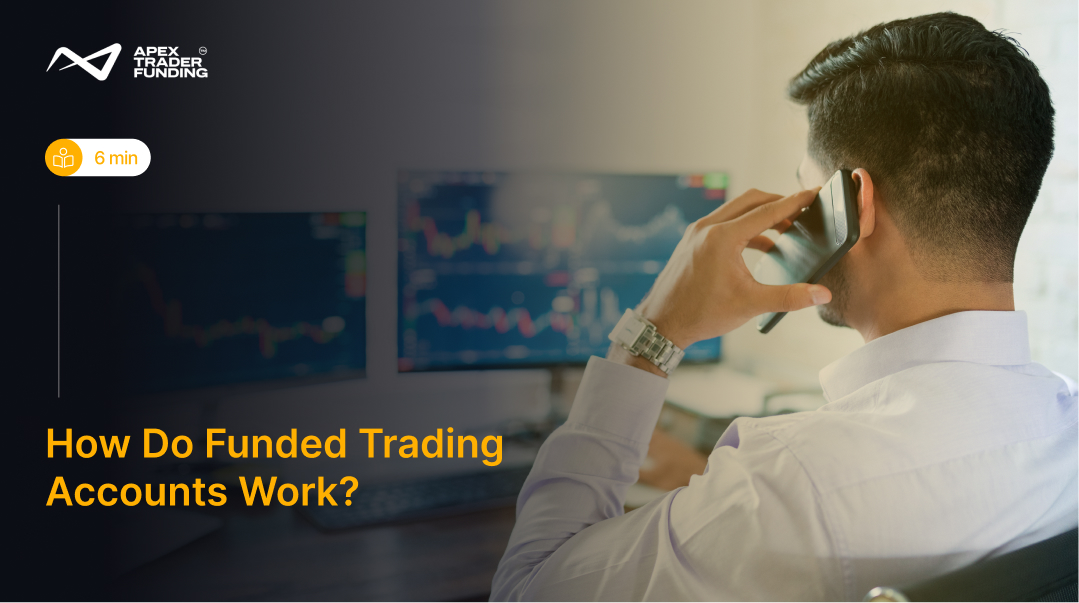
trading-education | 23-08-25
How Do Funded Trading Accounts Work?
A funded trading account works by granting a trader access to a firm's capital after they pass a simulated evaluation....
Read more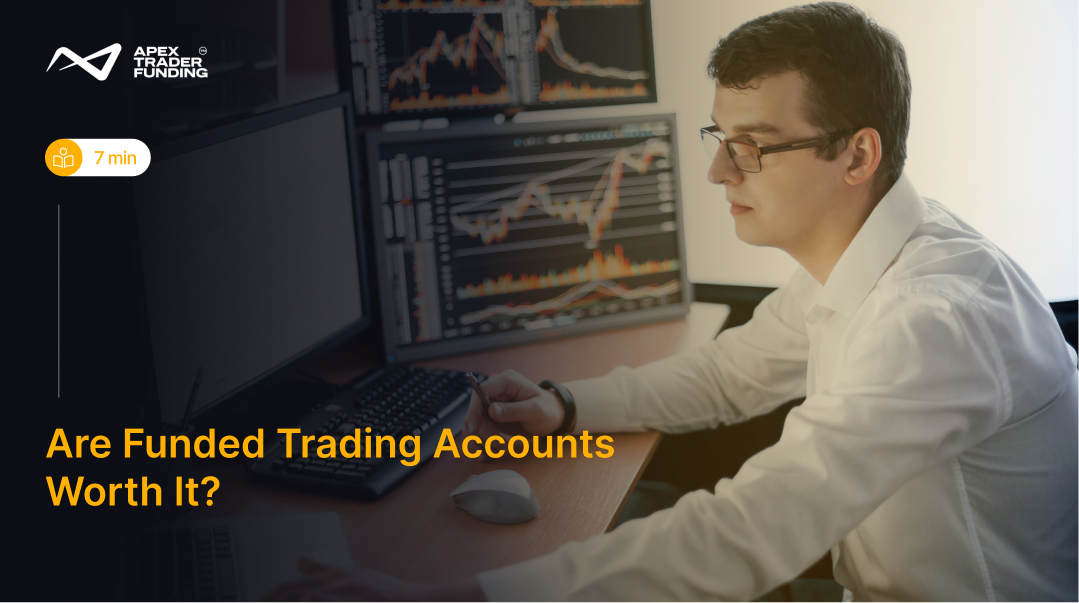
trading-education | 26-08-25
Are Funded Trading Accounts Worth It?
Is a Funded Account Worth It?Yes, for traders with a proven strategy, a funded account is worth it because it...
Read more